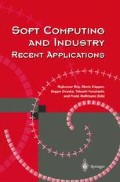Abstract
We describe in this paper the application of soft computing techniques to controlling non-linear dynamical systems in real-world problems. Soft computing consists of fuzzy logic, neural networks, evolutionary computation, and chaos theory. Controlling real-world non-linear dynamical systems may require the use of several soft computing techniques to achieve the desired performance in practice. For this reason, several hybrid intelligent architectures have been developed. The basic idea of these hybrid architectures is to combine the advantages of each of the techniques involved in the intelligent system. Also, non-linear dynamical systems are difficult to control due to the unstable and even chaotic behaviors that may occur in these systems. The described applications include manufacturing, robotics, adaptive filters, battery charging and reactors.
Access this chapter
Tax calculation will be finalised at checkout
Purchases are for personal use only
Preview
Unable to display preview. Download preview PDF.
References
Castillo, O. and Melin, P. (1998) “A New Fuzzy-Fractal-Genetic Method for Automated Mathematical Modelling and Simulation of Robotic Dynamic Systems”, Proceedings of FUZZ’98, IEEE Press, Anchorage, Alaska, USA, Vol. 2, pp. 1182–1187.
Castillo, O. and Melin, P. (1999) “ A New Fuzzy Inference System for Reasoning with Multiple Differential Equations for Modelling Complex Dynamical Systems”, Proceedings of CIMCA’99, IOS Press, Vienna, Austria, pp. 224–229.
Castillo, O. and Melin, P. (2001)“Soft Computing for Control of Non-Linear Dynamical Systems”, Springer-Verlag, Heidelberg, Germany.
Melin, P. and Castillo, O. (1998) “ A New Method for Adaptive Model-Based Neuro-Fuzzy-Fractal Control of Non-Linear Dynamic Plants: The Case of Biochemical Reactors”, Proceedings of IPMU’98, EDK Publishers, Paris, France, Vol. 1, pp. 475–482.
Melin, P. and Castillo, O. (1999) “ A New Method for Adaptive Model-Based Neuro-Fuzzy-Fractal of Non-Linear Dynamical Systems”, Proceedings of ICNPAA, European Conference Publications, Daytona Beach, USA,pp. 499–506.
Montiel, O., Sepulveda, R., Castillo, O. and Melin, P. (2001)“A Breeder Genetic Algorithm for Filter Optimization”, Proceedings of SCI’2001, IIIS Press, Orlando, USA,pp. 556–561.
Mandelbrot, B. (1987). “The Fractal Geometry of Nature”, W.H. Freeman and Company”.
Zadeh, L. A. (1975). “ The Concept of a Linguistic Variable and its Application to Approximate Reasoning”, Information Sciences, 8, pp. 43–80.
Author information
Authors and Affiliations
Editor information
Editors and Affiliations
Rights and permissions
Copyright information
© 2002 Springer-Verlag London
About this chapter
Cite this chapter
Castillo, O. (2002). Soft Computing for Control of Dynamical Systems. In: Roy, R., Köppen, M., Ovaska, S., Furuhashi, T., Hoffmann, F. (eds) Soft Computing and Industry. Springer, London. https://doi.org/10.1007/978-1-4471-0123-9_8
Download citation
DOI: https://doi.org/10.1007/978-1-4471-0123-9_8
Publisher Name: Springer, London
Print ISBN: 978-1-4471-1101-6
Online ISBN: 978-1-4471-0123-9
eBook Packages: Springer Book Archive

